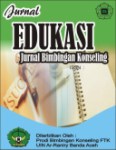KEEFEKTIFAN PENDEKATAN BEHAVIOR MENGGUNAKAN TEKNIK TOKEN ECONOMY UNTUK MENINGKATKAN ATENSI BELAJAR SISWA KELAS VIII DI SMP N 29 SEMARANG
DOI:
https://doi.org/10.22373/je.v6i2.6573Keywords:
atensi belajar, pendekatan behavior, teknik token economyAbstract
This study aims (1) to identify and analyze students' attentiveness levels of learning before getting a behavioral approach using token economy techniques, (2) identifying and analyzing learning attentions when getting behavioral approaches using token economy techniques, and (3) analyzing the effectiveness of behavior approaches using token economy techniques in increasing student attention in class VIII at SMP N 29 Semarang. This research is an experimental research with one group pretest-posttest design. Data collection techniques used were psychological scales with a learning attention instrument of 35 items. The population in this study were students of class VIII at SMP N 29 Semarang with a total sample of 5 students who were determined purposively. Data analysis techniques used (1) quantitative descriptive analysis to describe the level of student learning attention, (2) hypothesis testing with Wilcoxon analysis to determine the effect of the behavior approach using token economy techniques. The results showed that the behavioral approach using token economy techniques had an effect on increasing student attention
References
Aljuhaish, S. F. (2015). The effectiveness of behaviourist ’ s token economy system on teaching english as a second language at saudi schools in Kuala Lumpur. International Journal Od Novel Research in Education and Learning, 2(3), 43–49.
Brochard, L. (2019). June 1 (pp. 1–3). pp. 1–3.
Corey, G. (2005). Teori dan Praktek Konseling & Psikoterapi. Bandung: PT Refika Aditama.
Hadi, R. F. (2016). Proses Pembelajaran Mmatematika pada Anak Slow Learners (Lamban Belajar). Premiere Educandum, 6(3), 35–41.
Heryanto, D., & Mulyasari, E. (2017). Penerapan Teknik Modifikasi Perilaku Token Siswa Kelas V Sekolah Dasar. II(1).
Khairani, M. (2017). Psikologi Belajar. Yogyakarta: Aswaja Pressindo.
Komalasari, G., Wahyuni, E., & Karsih. (2016). Teori dan Teknik Konseling. Jakarta: PT Indeks.
Larasati, R., Boediman, L. M., & Aswanti, M. (2017). Penerapan prinsip DIR/Floortime Meningkatkan Kemampuan Memusatkan Atensi pada Anak dengan ADHD. Jurnal Ilmu Perilaku, 1(1), 33. https://doi.org/10.25077/jip.1.1.33-44.2017
Ling, J., & Catling, J. (2012). Psikologi Kognitif (R. Rahmat & A. Maulana, Eds.). Jakarta: Erlangga.
Packard, R. G. (1970). The Control of " Classroom Attention ": A Group Contingency for Complex Behavior. Journal of Applied Behavior Analysis, 3(I), 13–28.
Rahmawati, K. R. (2013). Token Economy untuk meningkatkan atensi pada anak Attention Deficit Disorder. 1(1), 36–40.
Salehah, A., Anward, H. H., & Rachmah, D. N. (2018). Perbedaan Intensitas Atensi Siswa Pada Suhu Dingin, Ideal, Dan Panas Di Smk Telkom Sandhy Putra Banjarbaru. Jurnal Ecopsy, 3(1). https://doi.org/10.20527/ecopsy.v3i1.1939
Slameto. (2010). Belajar & Faktor-faktor yang Mempengaruhinya. Jakarta: Rineka Cipta.
Solso, R. L., Maclin, O. H., & Maclin, M. K. (2007). Psikologi Kognitif (8th ed.; W. Hardani, Ed.). Jakarta: Erlangga.
Sugihartono. (2007). Psikologi Pendidikan. Yogyakarta: UNY Press.
Usman, M. U. (2009). Menjadi Guru Profesional. Bandung: PT Remaja Rosdakarya.


